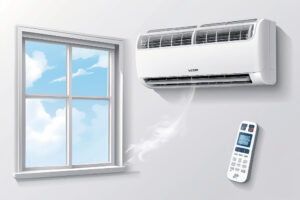You might be surprised to learn that your air conditioning unit might play a more important part in preserving staff health during the summer months than you realize. This is just one of the many reasons to keep your workplace cool during the summer months. Heat stress can be quite dangerous to one’s health, so it’s always best to be on the safe side and have your air conditioning unit running and in good working order throughout the summer. Here we brought you an in-depth article regarding how air conditioning protects against heat stress. Keep reading.
What Is Heat Stress and How Does It Manifest Itself?
What is meant by heat stress is when the body is unable to regulate its internal temperature (for whatever cause), including through sweating, and the temperature increases to dangerous levels. In reality, this is the root cause of nearly all heat-related illnesses: the body’s inability to adequately expel the excess heat produced.
When Does Heat Stress Have an Effect on Employees?
Heat stress may have a variety of various effects on different people, depending on a variety of different circumstances. Various factors influence whether or not an employee is vulnerable to it; these variables can include physical fitness, high or low blood pressure, and whether or not the person has a cardiac issue. Furthermore, it can be particularly harmful to those who are working outside in direct sunlight or who are performing heavy manual labor.
In Australia, the elderly, children, and those with health issues are particularly in danger from heatwaves. The elderly, pose a considerably greater threat because of inadequate blood circulation, ineffective sweat glands, age-related diseases, and medicines. It’s essential that we recognize the symptoms of body heat exhaustion to allow you to notice when you’re entering danger and take actions to cool yourself down.
The following are some of the signs and symptoms of heat stress:
- Having trouble concentrating
- Fainting
- Dehydrate to the extreme
- Heatstroke
- Muscle cramping and spasms
- Heat rash
The body’s response to this situation is to conserve energy by storing heat. Extreme heat stress can result in symptoms such as cramps, fatigue, and even a heart attack in severe situations. These are all important signs of heat stress.
Air Conditioning Helps to Keep Workers Safe and Healthy on the Job.
Because a large portion of the issues connected with heat stress is caused mostly by temperature (as you might expect), having a well-maintained and effective air conditioning system might assist avoid cases of ill health from occurring altogether. A large number of offices rely primarily on air conditioning to ventilate themselves, making it extremely important for maintaining employee health. Especially in the summer, small workplaces may heat up much more quickly than people realize; in addition, major electrical equipment such as photocopiers and printers can emit radiant heat that quickly contributes to the overall radiant temperature of the space.
It’s important to note that merely opening a window will not provide the same level of effectiveness in cooling space as an air conditioning machine. To the point where we clearly stated it in our blog post on typical air conditioning blunders not so long ago: opened doors and windows are more likely than closed doors and windows to allow warm air in instead of cold air out, heating a workplace more frequently than they cool it.
For these and other reasons, a well-maintained air conditioning system is the most effective means of shielding personnel from the severe impacts of heat stress, particularly during the summer months.
How Air Conditioning Helps to Minimize the Potential of Overheating the Body
Due to the rising temperatures caused by global warming, air conditioning is becoming increasingly necessary for maintaining our bodies at a safe temperature and preventing the danger of overheating. More than you would imagine, air conditioning protects us against heat fatigue in a variety of ways. Here’s a summary of how air conditioning might assist us.
Our Core Body Temperature Is Lowered When We Use Air Conditioning.
When you use air conditioning, the most obvious advantage is the reduction in air temperature, which lowers your body’s temperature to a safe level and allows you to return to homeostasis in the process. When you sweat, your body’s natural cooling system works really well, releasing heat via the skin and allowing it to disperse. However, the system is only effective up to a point; if your body temperature goes beyond 39°C, you are suffering a high fever and may develop hyperthermia, making a cooling mechanism such as air conditioning essential for your safety and health.
Lowering of Humidity Levels
Your body’s cooling function, as previously explained, releases heat in the form of warm perspiration, which finally evaporates from your skin. If you reside in Queensland or the Northern Territory, you will be familiar with the fact that when the humidity level outdoors reaches a certain level, your perspiration condenses on your skin and works as a wet warmer, making it even more difficult to cool off. When an air conditioner is set to cool mode, the refrigerant utilized in the system naturally eliminates humidity from the air, which aids in the removal of sticky heated perspiration from your skin and the reduction of your body temperature. Additionally, the majority of air conditioners offer a dehumidify mode that extracts excess humidity out of the air and speeds up the evaporation process.
Sleeping More Soundly
If you’ve ever fought your way through a scorching Brisbane night, you’ll know that one of the most difficult aspects of dealing with high temperatures and high humidity is trying to sleep in such conditions. And even if you do manage to sleep, your body is at danger of overheating as a result of the stress. Air conditioning takes care of the problem by controlling the temperature for you, allowing you to have a decent night’s sleep without being uncomfortable.
Also, you could discover that the temperature in your bedroom is comfortable for falling asleep, but that you frequently wake up in the middle of the night, drenched in perspiration. As a result, air conditioning is able to resolve the problem by maintaining a comfortable and optimal sleeping temperature (about 18°C).
Dehydration is Less Likely to Occur.
Excessive sweating leads us to lose water, which must be replaced on a regular basis in order to avoid getting dehydrated, which is especially important if we are exercising. We can keep hydrated by decreasing the quantity of perspiration that our bodies generate. When paired with lots of water consumption, air conditioning can help protect us from the dangers of heat exhaustion.
Hope this article helped you to understand how air conditioning protects against heat stress better. In addition, our professional HVAC service team is always love to be with you if you have any concerns. Please feel free to contact CoolWind Experts.
Want to know How to Install Split AC Without Drilling ?






